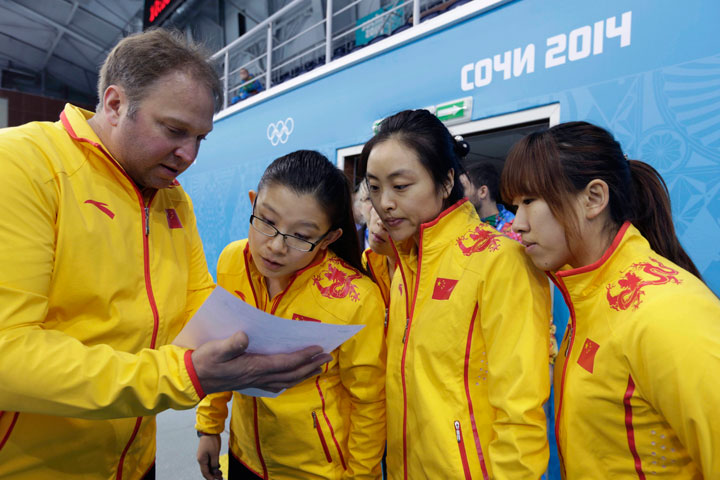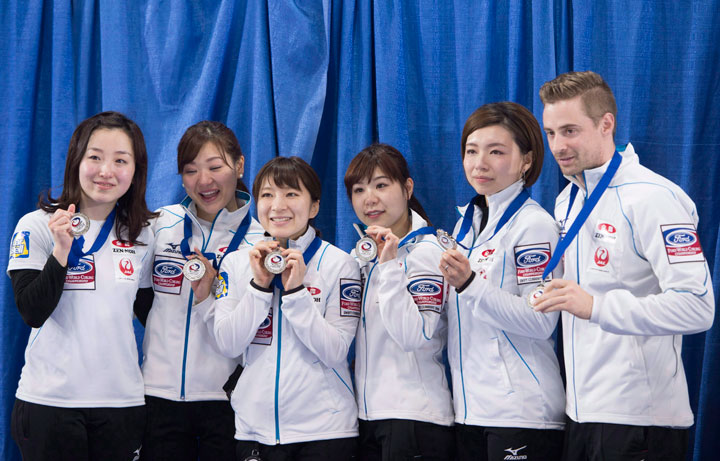When Canadian curlers play at the Winter Olympics in Pyeongchang, there’s a good chance that they’ll be facing another Canadian across the ice: their opponents’ coach.

Canadians are coaching teams from China, Japan, South Korea, Switzerland and Great Britain. It’s not just curling either – Canadians are coaching international bobsledders, speedskaters and hockey teams too.
A lot of countries are approaching Canada, said J.D. Lind, a Canadian who will be coaching the Japanese women’s and men’s curling teams at the Olympics. “They want to learn from what they see as the best and they want to have people teach them the most up-to-date things.”
Lind has been working for the Japanese curling program since 2013, when he applied for and got a job working in Hokkaido. He took the job, he said, partly because it was good timing: he and his wife had always wanted to live abroad, but partly because it was the kind of opportunity that didn’t exist in Canada.
“Curling’s not a professional sport even in Canada, so for me to get the opportunity to make a full-time salary doing it, was a big part of it,” he said. He was 28 when he took the job.
“For me at that point in my coaching career, there’s no way I would have been able to go to the Olympics as part of the national staff for the Canadians.”
Marcel Rocque, who is coaching the Chinese mixed doubles curling team this Olympics, also said a lack of opportunity in Canada was part of the reason he took a job overseas.
“I’m a schoolteacher, I can’t work part-time. I can’t travel around with the teams while I’m teaching school,” he said. “So in order to work full-time, I need to be paid full-time, and this isn’t as much of an opportunity in our country.”
Short track speedskating coach Kenan Gouadec went to Italy to work with another Canadian seven years ago, and is now in charge of their short track program. Like the other two coaches, part of the attraction was the challenge of reforming a national program and the opportunity to work at the top level. “I saw this opportunity. I wanted to go to the international level. I wanted to move to the Olympic-level athletes.”
Improving the game
Rocque worked with the Chinese team in Sochi and came back to Canada afterward, coaching Canadian Rachel Homan’s team in the meantime, but when the Chinese asked him to return, he decided to go. One reason he gave for leaving, he said, was for the betterment of the sport.
“Like hockey for women, if it’s only a two-country race, if it’s always Canada and U.S., and there are no other competitors, pretty soon that’s taking a back seat at the Olympics and it’s maybe not as it should be. A healthy game globally is better for curling and ultimately better for Canada as well.”
Lind agrees. It’s not about hurting Canada’s chances at a medal, he said. “I think the biggest change is that the international teams are getting better. And I don’t think that necessarily makes the Canadians worse. It will maybe make them work harder to continue to keep up, but for the health of the game as a whole internationally, you need more than just one powerhouse country.”
Canada just has too much sports talent for the number of national coaching jobs, said Gouadec.
“We should see it as a positive thing that Canada is exporting coaches and other countries want Canadian coaches because that means Canada is showing itself to be one of the better sporting countries in the world.”
Competing against Canada
But is it awkward competing against your home country? All three coaches say yes, at least at first.
“It was difficult. I’m a proud Canadian. I wear the Maple Leaf with as much pride as anyone else,” said Rocque.
The reason he’s only coaching China’s mixed doubles team this Olympics and not also their women’s team is he didn’t want to have to face Rachel Homan, who will be competing for Canada. “She’s like family,” he said.
Lind will cheer for his friends, he said, but he also works hard for his Japanese athletes. “I would say, when I first went, it was definitely a little different trying to represent a different country. Now that I’ve been doing it for longer, I don’t really see it as being awkward or anything for me. I’m very proud of the work I’ve done in Japan, but I’m proud to be Canadian.”
“There are a ton of us and a lot of people kind of get the misconception that by us going, we’re hurting Canada’s chances. But for us, we love the game. We love curling and we want to see the game strong, not just Canadian curling.”






Comments